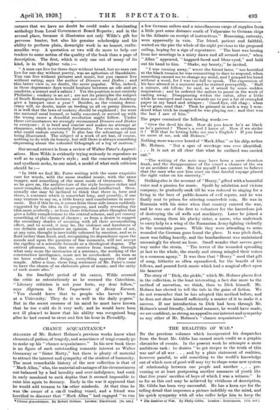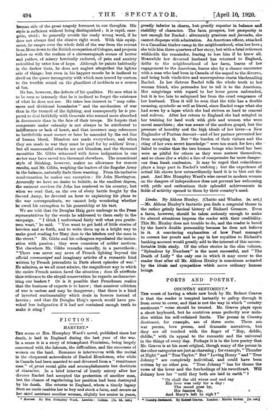THE REALITIES OF WAR.*
BY the previous volumes which incorporated his despatches from the front Mr. Gibbs has earned much credit as a graphic chronicler of events. In the present work he attempts a more ambitious task : he desires " to get deeper to the truth of this war and of all war . . . and by a plain statement of realities, however painful, to add something to the world's knowledge out of which men of good-will may try to shape some new system of relationship between one people and another . pre- venting or at least postponing another massacre of youth like that five years' sacrifice of boys of which I was a witness." In so far as this end may be achieved by vividness of description, Mr. Gibbs has been very successful. He has a keen eye for the telling detail that impresses a picture indelibly on the mind, and his quick sympathy with all who suffer helps him to keep the • The Realities of 'Var. By Phillp Gibbs. London : Heinemann. [15s. net.]
human side of the great tragedy foremost in our thoughts. His style is sufficient without being distinguished ; it is rapid, ener- getic, vivid ; he generally avoids the ready wrong word, if he does not always find the elusive right word. With this equip- ment, he ranges over the whole field of the war from the retreat from Mons down to the British occupation of Cologne, and projects before us with the realism of a cinematograph scenes of horror and pathos, of misery heroically endured, of pain and anxiety redoubled by utter loss of hope. Although he paints habitually in the darker tints, he does not neglect altogether the lighter side of things ; but even in his happier moods he is inclined to dwell on the queer incongruity with which men inured by custom to the terrible seized on the ghastliest of incidents as a source of fun.
He has, however, the defects of his qualities. He sees what is to be seen so intensely that he is inclined to forget the existence of what he does not see. He takes less interest in " map refer- ences and divisional boundaries " and the mechanism of war than in the turmoil of the fighting, and consequently he is pre- pared to deal faithfully with Generals who seemed more absorbed in documents than in the fate of their troops. He forgets that composure under calamity is not always to be attributed to indifference or lack of heart, and that incorrect map references to battlefields must sooner or later be amended by the red line of human blood. Blunders are made everywhere, and when they are made in war they must be paid for by soldiers' lives ; but all unsuccessful attacks are not blunders, and the thousand casualties Mr. Gibbs witnessed with fierce indignation in one sector may have saved ten thousand elsewhere. The sensational style of thinking, however, makes no allowance for remote results, and Mr. Gibbs, weighing the leaders of the Regular Army in the balance, naturally finds them wanting. From his inclusive condemnation he makes one exception : Sir John Harrington. Assuredly we have no desire to belittle, in the smallest degree, the eminent services Sir John hats rendered to his country, but when we read that, on the eve of every battle fought by the Second Army, he devoted an hour to explaining his plans to the war correspondents, we cannot help wondering whether he owed his exemption to his generalship or his tact.
We are told that Sir Douglas Haig gave umbrage to the Press representatives by the words he addressed to them early in the campaign. " I think I understand fairly well what you gentle- men want," he said. " You want to get hold of little stories of heroism and so forth, and to write them up in a bright way to make good residing for Mary Ann in the kitchen and the man in the street." Mr. Gibbs and his colleagues repudiated the insinu- ation with passion ; they were conscious of nobler motives. Yet elsewhere Mr. Gibbs remarks casually, in a parenthesis " There was never any news of French fighting beyond the official communique and imaginary articles of a romantic kind written by French journalists in Paris about episodes of war." He admires, as we all must admire, the magnificent way in which the entire French nation faced the situation ; does lase attribute their reticence to the stupid conservatism he regards aseharacter- ieing our leaders ? Or is it possible that Frenchmen realize that the business of experts is to know ; that amateur criticism of war is useless and may be dangerous ; that there is a kind of inverted sentimentality which deals in horrors instead of heroics ; and that Sir Douglas Haig's speech would have pro- voked less indignation if it had not contained enough truth to make it sting ?



































 Previous page
Previous page